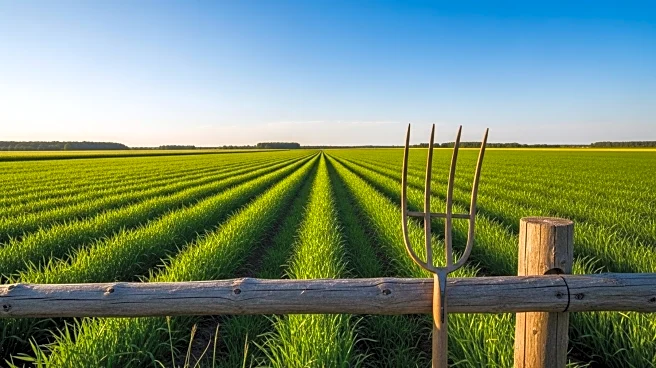What is the story about?
What's Happening?
The European Union has unveiled proposals to protect its farmers from potential negative impacts of the Mercosur trade deal. The agreement with Mercosur countries aims to eliminate duties on goods traded between the EU and South America over 15 years, creating a large free trade zone. However, European farmers have expressed concerns about being undercut by cheaper imports. The EU's proposals include mechanisms for farmers to report trade imbalances and trigger investigations. If import prices from Mercosur are significantly lower, the EU could temporarily withdraw preferential tariffs. Special provisions are included for sensitive sectors like beef and ethanol.
Why It's Important?
The Mercosur trade deal is poised to create one of the world's largest free trade zones, impacting global trade dynamics. For the EU, the deal promises economic benefits by reducing tariffs and saving businesses billions annually. However, the agricultural sector, central to the EU's economy and culture, faces challenges from increased competition. The proposed protections aim to balance economic growth with safeguarding local farmers' interests. The deal's success could influence EU trade policy, setting precedents for future agreements. It also highlights tensions between economic liberalization and protecting domestic industries, a key issue in global trade negotiations.
What's Next?
The Mercosur trade deal requires ratification by the EU's member states and the European Parliament. The proposed protections may help garner support from skeptical countries with significant agricultural sectors. As negotiations progress, the EU will need to address farmers' concerns while promoting the economic benefits of the deal. The outcome could affect EU trade relations with South America and influence future trade agreements. The agricultural sector's response, including potential protests, will be crucial in shaping the deal's implementation and impact on EU policy.
Beyond the Headlines
The Mercosur deal raises questions about environmental sustainability and ethical trade practices. Critics argue that increased imports could lead to deforestation and environmental degradation in South America. The EU's commitment to sustainable trade practices will be tested as it navigates these concerns. The deal also reflects broader geopolitical shifts, with the EU seeking to strengthen ties with South America amid global trade tensions. The balance between economic growth and environmental responsibility will be a key challenge for policymakers.















